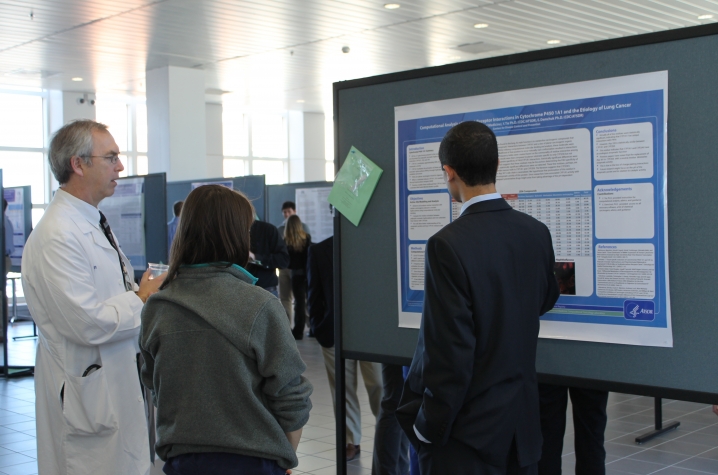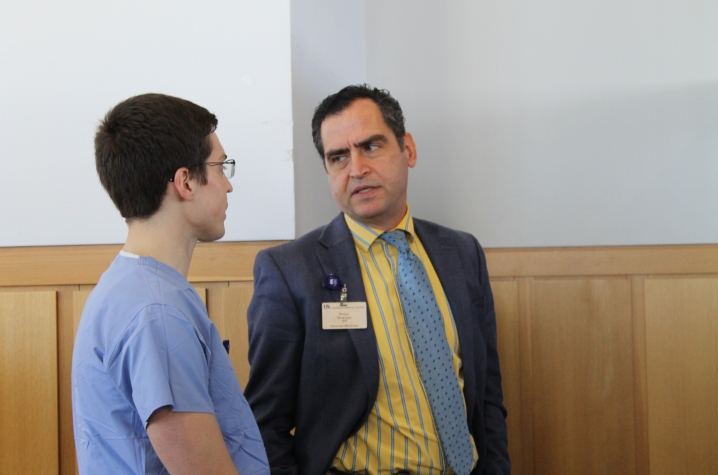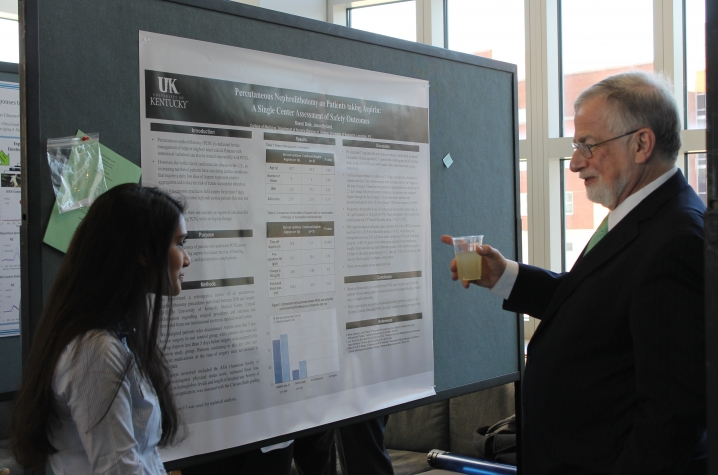AOA MD/PhD Research Symposium: a "Celebration of Curiosity"
LEXINGTON, Ky. (Feb. 25, 2014) - In what organizers described as a "celebration of curiosity," the University of Kentucky College of Medicine hosted the Alpha Omega Alpha Groves Memorial MD/PhD Student Research Symposium and Dean's Distinguished Lecture Series on Friday, Feb. 21.
Fifty six students from the College of Medicine presented posters outlining findings from their research projects -- a record number for this event, which highlights the institutional focus on student research participation. Three additional students were asked to give oral presentations on their research.
In conjunction with the Research Symposium, Dr. Andrew Schafer, professor of medicine in Hematology-Oncology at Weill Cornell Medical College, discussed the debate that the physician-scientist is an "endangered species" as part of the Dean's Distinguished Lecture Series.
This event was managed by the Alpha Omega Alpha student honor society, who reviewed research poster submissions and selected students for oral presentations.
Dr. Peter Sawaya, professor of medicine and director of the CCTS-sponsored PSMRF (Professional Student Mentored Research Fellowship) Program at the University of Kentucky, is a passionate advocate for student research.
"Adding research to a medical student's educational experience greatly increases that student's dimension of knowledge," Sawaya says. "The best doctors are excellent critical thinkers, they have intellectual curiosity, they ask questions, and they make careful and deliberate judgments."
"All of those skills are also embodied in the research process," Sawaya adds. "So, logically, introducing our students early and deliberately to research improves their skill set, whether they ultimately end up practicing in an academic health center or a community hospital."
Sawaya says that this strategy seems to be bearing fruit. In a recent survey, more than two-thirds of UK College of Medicine students reported they had participated in research, which is considerably higher than the national average. And, in an interesting twist on "researching the research," UK COM students are now looking for correlations between student research and career trajectory.
"We fully expect to find a positive relationship," Sawaya says."Hundreds of students graduate from medical schools every year, but how many of them can say they've already presented their findings at this meeting, or had their findings published in that journal? It makes them much more competitive when they seek their residency, and beyond."
In his lecture, Dr. Schafer analyzed what he called the most serious challenge facing academic medicine today -- "the real threat that the physician is vanishing as a participant in the research enterprise."
"Some people ask, 'Why is this a problem? Why do we need [physician-scientists] at all?" he said. "Because the physician offers a unique perspective. Their questions are inspired by personal experience with patient care."
"It's what we call the 'bedside to bench' phenomenon, and it can have the potential for more impact than the reverse," Dr. Schafer said.
Schafer says many factors have contributed to the decline of the physician-scientist, including trends that plague all industries, such as changing family structures and the the balance struggle for women who want to have a successful career and raise a family.
Ultimately, Schafer offered several guidelines for revitalizing the physician-scientist career path - including, he said pointedly, the need to develop a culture where physicians can do research, and researchers can participate in the clinical enterprise.
"Which is exactly what this Research Symposium is designed to achieve," Sawaya says. "There is a real need for discourse about how to reverse the trend of divergent research cultures, how to develop a sense of teamwork between scientists involved in clinical research and those in basic research."







